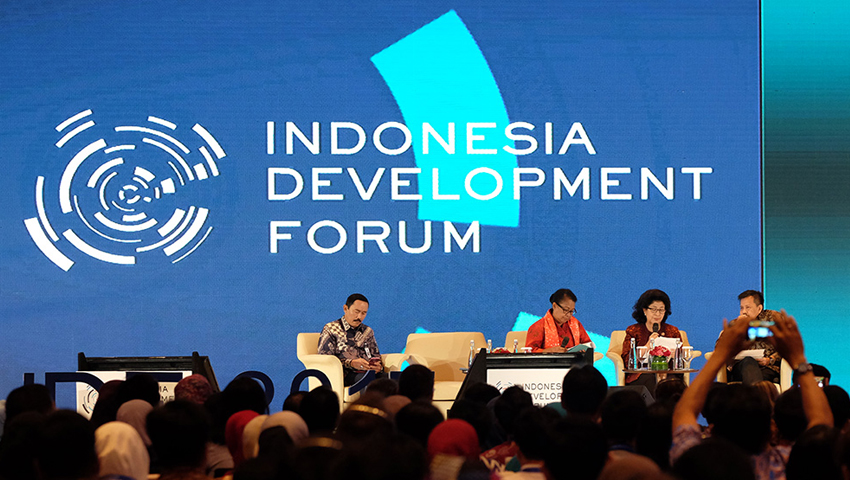Vira R Ramelan
On 9-10 August 2017, the initial Indonesia Development Forum with national and international participationwas successfully convened at the Gama Tower in Jakarta. Organized by Bappenas with support from the Government of Australia through the Knowledge Sector Initiative, the Forum engaged more than 1,500 registered participants over two days to meet, share and discuss innovative solutions to Indonesia’s increasingly urgent problem of inequality, under the theme Fighting Inequality for Better Growth.
The Vice President of Indonesia, Jusuf Kalla, officially opened the forum, saying efforts must be increased to reduce poverty and inequality. “This is why we have to work hard to increase productivity, which will result in improvements in Indonesia,” the vice president said.
In an opening video, President Joko Widodo stated that reducing inequality is a top priority for the government. “Essentially, development should aim to reduce inequality and increase people’s standard of living. People’s participation and engagement is the key for successful development.”
Bappenas, as Indonesia’s national development planningagency, is leading efforts to achieve the goals set by the president. The IDF itself is designed to provide a national convening platform to discuss challenges, generate new ideas and seek innovative solutions to Indonesia’s development challenges. The Minister of Bappenas highlighted that programmes will prioritise support to the lowest 40 percent of the income group, in order to address inequality. He added that support for micro, small, and medium enterprises and the micro-level economy, as well as access to the financial sector for all, are key priorities of the government’s development programmes.
The Minister also addressed the importance of multistakeholder collaboration to address inequality.
“We need participation from outside the government. Inequality is not only an issue for government. Of course the government is responsible for reducing inequality but the government cannot do it alone. The government needs support and we need to collaborate. … At the end of the day we know that everybody must help each other in order to reduce inquality”.
Knowledgeable Speakers and Engaging Discussions
Designed to inspire, imagine and innovate, the IDF invited a number of high-level national and international speakers including: the Coordinating Minister ofEconomic Affairs, Darmin Nasution; the Minister of Public Works and Public Housing, Basuki Hadimuljono; the Minister of Health, Nila Djuwita F Moeloek; the Minister of Women’s Empowerment and Child Protection, Yohana Yembise; the Minister of Finance and National Planning of Tonga, Tevita Lavemaau; and the Minister of Agriculture of the Republic of Fiji, Inia Batikoto Seruiratu. Governors, mayors and bupatis, academics and researchers, development practitioners and civil society leaders shared their perspectives and experiences. Over the two days,152 speakers–including 44 development innovators selected competitively from 555 submitted papers provided ground-breaking ideas on how to address Indonesia’s inequality problems. The Forum also provided networking and pitching opportunities for development innovators in a special session, the Ideas and Innovations Marketplace.
Some Highlights of the Discussions
In his opening presentation, the Coordinating Minister of Economic Affairs, Darmin Nasution, mentioned three focus areas for overcoming problems with inequality: land ownership through agrarian reform; increased economic opportunities through tax reform, manufacturing and information and technology; and improvement in the quality of human resources through vocational schools and labour markets.
The discussion also covered corruption as a factor contributing to poverty and inequality. The head of the Corruption Eradication Commission, Agus Rahardjo, suggested that bureaucratic reform and single identity numbers were seen as possible basic solutions for corruption eradication in Indonesia.
In addressing inequality, Prof. Martin Ravallion, an international economist from the Georgetown University, pointed out political will and administrative effectiveness as critical issues.
“The biggest issues in my view are political will and administrative effectiveness. We need to learn more about the capability for actually implementing policies. We are going to need to learn more, of course, more research will be needed. But I point to both the importance of political will and administrative capability for effective implementation, including financing”.
Bradley Armstrong, Charge d’Affaires at the Australian Embassy in Jakarta,explained how Australia continues to grapple with challenges in addressing inequality, and shared the Australian taxation system as a means to significantly decrease inequality and fund policies. Chris Tinning, the Chief DFAT Economist, shared important lessons in addressing inequality through policy reform in three major areas: first, enhancing Indonesia’s competitiveness in its services industry; second, taxation reform to boost government revenue necessary to finance infrastructure, education and health; and third, better-targeted government spending.
A Great Pathway Forward
The feedback from the IDF has been extremely positive. In addition to the high-level of engagement during the sessions, participants have expressed enthusiasm about the range of topics discussed and their relevance, the engaging and knowledgeable speakers, the format of the sessions, and the overall quality of discussions. The IDF was covered in 310 articles in national media, including headlines in KOMPAS over two days. #IDF2017 was the number one trending Twitter topic on the opening day. The enthusiastic response from the audience points tothe necessity of a forum that champions knowledge-based input for Indonesia’s development policies.
The Minister of National Development Planning closed the forum, promising to use results as input in development planning. “Of course we will use the IDF results for the next national planning process. Both in terms of annual planning, which includes next year’s national planning, but equally importantly we will use the IDF results for our preparation of the next fiveyears 2020-2024, and even for the long-term, 2025-2045.”
The IDF is not a one-off event. It was the first of what will be an annual platform for Indonesian government leaders, the private sector, academiaand other members of society to collaborate toensure that Indonesia’s development agenda is based on robust knowledge and evidence and tobuild productive partnerships among stakeholders in Indonesia.
All conference materials, including presentations, photos and videos are now available on www.indonesiadevelopmentforum.com, which will also become an online collaborative platform leading up the 2018 IDFon the topic of “Regional Disparity in Indonesia”.






